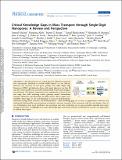Critical Knowledge Gaps in Mass Transport through Single-Digit Nanopores: A Review and Perspective
Author(s)
Faucher, Samuel; Aluru, Narayana; Bazant, Martin Z; Blankschtein, Daniel; Brozena, Alexandra H; Cumings, John; Pedro de Souza, J; Elimelech, Menachem; Epsztein, Razi; Fourkas, John T; Rajan, Ananth Govind; Kulik, Heather J; Levy, Amir; Majumdar, Arun; Martin, Charles; McEldrew, Michael; Misra, Rahul Prasanna; Noy, Aleksandr; Pham, Tuan Anh; Reed, Mark; Schwegler, Eric; Siwy, Zuzanna; Wang, YuHuang; Strano, Michael; ... Show more Show less
DownloadAccepted version (7.130Mb)
Terms of use
Metadata
Show full item recordAbstract
Copyright © 2019 American Chemical Society. Not all nanopores are created equal. By definition, nanopores have characteristic diameters or conduit widths between ∼1 and 100 nm. However, the narrowest of such pores, perhaps best called Single Digit Nanopores (SDNs) and defined as those with regular diameters less than 10 nm, have only recently been accessible experimentally for precision transport measurements. This Review summarizes recent experiments on pores in this size range that yield surprising results, pointing toward extraordinary transport efficiencies and selectivities for SDN systems. These studies have identified critical gaps in our understanding of nanoscale hydrodynamics, molecular sieving, fluidic structure, and thermodynamics. These knowledge gaps are, in turn, an opportunity to discover and understand fundamentally new mechanisms of molecular and ionic transport at the nanometer scale that may inspire a host of new technologies, from novel membranes for separations and water purification to new gas-permeable materials and energy storage devices. Here we highlight seven critical knowledge gaps in the study of SDNs and identify the need for new approaches to address these topics.
Date issued
2019Department
Massachusetts Institute of Technology. Department of Chemical Engineering; Massachusetts Institute of Technology. Department of MathematicsJournal
Journal of Physical Chemistry C
Publisher
American Chemical Society (ACS)